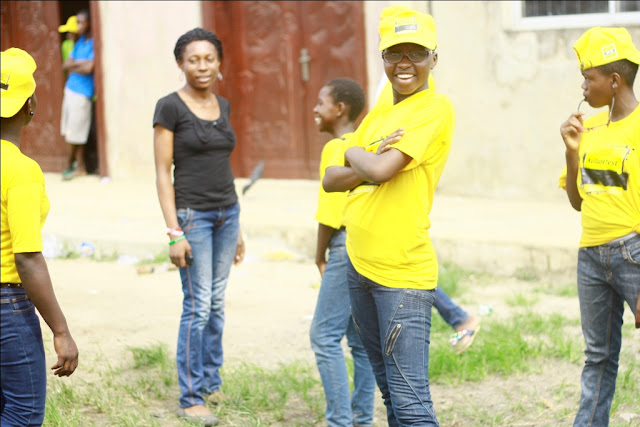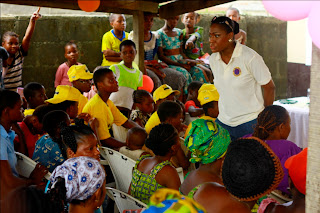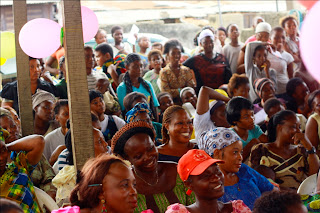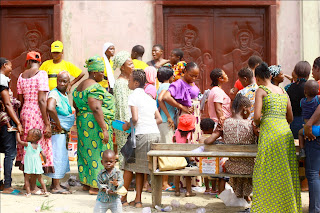"The problem with our system of formal education is that very
little consideration if any is given at all to out of school teenage
girls. Technology makes it possible for education to come to them – no
matter where they are, at a farm, in their shops, in their backyards or
while nursing their new born.
Social media can be a neutral player when used correctly, out
of school teenage girls can get information and learn in an inclusive
environment where they are not labeled or made fun of, or dropping out
or bullied into conformity."
Every girl needs a Shero

The aim of this blog is to critically appraise Nigerian Social Institutions, whilst professing innovative and creative ways of improved service provision within available resources but most importantly within safe ethical guidelines of social work during intervention, counselling and rehabilitation. Constructive feedback is encouraged - Happy reading!
Monday, December 23, 2013
Offer: Applications Now Open for the 2014 class of the Carrington Youth Fellowship Initiative | World Pulse
The Carrington Youth Fellowship Initiative, an initiative of the U.S Consulate in Lagos, Nigeria, fondly called CYFI is now accepting applications from youths currently based in Lagos, for the 2014 fellowship class.
This fellowship provides funding, mentorship and networking for inovative Nigerian youths passionate about bringing about change in their communities.
Application closes on the 3rd of January 2014.
Offer: Applications Now Open for the 2014 class of the Carrington Youth Fellowship Initiative | World Pulse
This fellowship provides funding, mentorship and networking for inovative Nigerian youths passionate about bringing about change in their communities.
Application closes on the 3rd of January 2014.
Offer: Applications Now Open for the 2014 class of the Carrington Youth Fellowship Initiative | World Pulse
Climate Change and People With Disabilities (PWDs): Awareness, Vulnerability, Adaptation | World Pulse
"Even though it falls under the purview of the Lagos State Emergency Management Agency (LASEMA), to ensure the safety and protection of PWDs during emergencies, no one could give me the figure for the number of PWDs who were successfully rescued/evacuated or who have lost their lives during recent flooding in the State. This reflects the dearth of adequate record keeping at the very least and non-performance on the part of this agency towards ensuring the safety of PWDs."
Climate Change and People With Disabilities (PWDs): Awareness, Vulnerability, Adaptation | World Pulse
Climate Change and People With Disabilities (PWDs): Awareness, Vulnerability, Adaptation | World Pulse
Education of the Differently Abled Girl-child: To What End? | World Pulse
"When we educate differently abled girls, we probably are not doing it, so as to enable them become the next CEO or ED of a multinational company, but we are first and foremost guaranteeing them their basic, inalienable rights as humans and we are helping them reaffirm their worth and build their confidence in themselves and their capabilities which are limitless"
Education of the Differently Abled Girl-child: To What End? | World Pulse
Bose Speaks in Death | World Pulse
"*Bose allowed me record our interview for two reasons:
• She needed help urgently and she wanted me to share her voice with anyone who might be able to;
• She wanted other women to learn from her life story, so that they do not to fall victims of the same fate as she did.
In the interview, she tells a story of how her husband made her leave her well paying job immediately after he got a job; how he made her have three abortions while he was making babies with another woman; and how she could no longer have children of her own because of the abortions she’s had."
Bose Speaks in Death | World Pulse
• She needed help urgently and she wanted me to share her voice with anyone who might be able to;
• She wanted other women to learn from her life story, so that they do not to fall victims of the same fate as she did.
In the interview, she tells a story of how her husband made her leave her well paying job immediately after he got a job; how he made her have three abortions while he was making babies with another woman; and how she could no longer have children of her own because of the abortions she’s had."
Bose Speaks in Death | World Pulse
We were trafficked. Now we are illegal migrants | World Pulse
As a peer educator on Illegal Migration Awareness and Alternatives to Violence with the Prisoners Rehabilitation and Welfare Action (PRAWA) a non-governmental organization based in Nigeria, I have had the opportunity of speaking with survivors of child trafficking and illegal migration.
The stories of three young women have remained with me for over a year now.
*Christy was 12 when an aunt visited her hometown, Benin City from Spain. The aunt who was very impressed with the way she looked and how she has developed physically expressed her interest in returning abroad with her, promising to adopt her upon her arrival.
Christy was excited; finally, she would fly in an aeroplane, meet a Caucasian man and have children with long silky hair. Her parents were beside themselves with joy. Christy could finally bring them all out of poverty going back five generations and take her other siblings to Europe too.
As per the aunts request, Christy would live with other girls about the same age as she was with an agent in Lagos for a certain amount of time. She will be ‘polished’ and socialized into behaving, speaking and dressing to fit the profile of a European girl. She would not have contact with her parents or anyone from home; this was necessary to prepare her for a life of focus and independence abroad.
When it came time for them to depart Lagos, they did not leave by aeroplane. Instead, they used back roads to neighbouring countries and waited in makeshift tents till night fall to cross international borders. Exposed to the elements, hungry, thirsty, she just wanted to go back home to her family, but there was no going back.
Six months into their journey, their guardians and escorts – six men announced to the 12 of them, the need to ‘begin practicing’ the trade they would be doing in Europe. They were subsequently gang raped night after another night."
We were trafficked. Now we are illegal migrants | World Pulse
The stories of three young women have remained with me for over a year now.
*Christy was 12 when an aunt visited her hometown, Benin City from Spain. The aunt who was very impressed with the way she looked and how she has developed physically expressed her interest in returning abroad with her, promising to adopt her upon her arrival.
Christy was excited; finally, she would fly in an aeroplane, meet a Caucasian man and have children with long silky hair. Her parents were beside themselves with joy. Christy could finally bring them all out of poverty going back five generations and take her other siblings to Europe too.
As per the aunts request, Christy would live with other girls about the same age as she was with an agent in Lagos for a certain amount of time. She will be ‘polished’ and socialized into behaving, speaking and dressing to fit the profile of a European girl. She would not have contact with her parents or anyone from home; this was necessary to prepare her for a life of focus and independence abroad.
When it came time for them to depart Lagos, they did not leave by aeroplane. Instead, they used back roads to neighbouring countries and waited in makeshift tents till night fall to cross international borders. Exposed to the elements, hungry, thirsty, she just wanted to go back home to her family, but there was no going back.
Six months into their journey, their guardians and escorts – six men announced to the 12 of them, the need to ‘begin practicing’ the trade they would be doing in Europe. They were subsequently gang raped night after another night."
We were trafficked. Now we are illegal migrants | World Pulse
The ALUU Four: Its Higher Significance
Just
over a year ago, four young men in their late teens and early twenties, all students
of the University of Port Harcourt, were brutally murdered in a community
called Aluu in Port Harcourt, Nigeria following an allegation of robbery. Barely
a few days afterwards, the internet and social media platforms were inundated with
videos and pictures of their murder. Once the Police had established that these
young men in their prime were no robbers, a public outrage for justice followed.
They were ordinary students who happened to be in the wrong place at the wrong
time.
On
reflection, it appeared that most of the outrage was not as a result of the
horrific way they were lynched and set ablaze by an angry mob, it was actually because
they were in fact ‘four innocent young students’ who were wrongfully “convicted”
by jungle justice and “summarily executed” by an angry mob. The truth is,
countless number of young men whose name we may never learn have been victims
of this same fate for offences ranging from alleged stealing of soft drinks or
money to sexual assault. And despite the mass outrage, many more men have been
murdered the same way since the Aluu Four tragedy.
Even
more gut wrenching are videos of young women being stripped naked and subjected
to the most humiliating and inhuman treatment because they allegedly stole a
blackberry phone or were ‘indecently’ dressed. Some of the videos feature
voices of members of the crowd saying things like “that serves them right! They
should know better than steal next time.” And sadly we hear of ‘Curative’ rape
for lesbian women and most times the perpetrators are never caught or
prosecuted even when in some cases their faces and voices were captured on
camera.
Nelson
Mandela once said that “The true character of a society is revealed in how
it treats its children [youths].” The Nigerian government indifference to the barbaric
treatment of its young people is symptomatic of its true character – ‘it does
not care’. The government has ensured young Nigerians stay hungry, jobless, out
of school and ultimately idle and unthinking. Young people feel vulnerable, disempowered
and systematically brainwashed into believing that they will never be good
enough to take on positions of authority as youths.
While
the young Nigerians waste away, filled with anger and frustration; leadership
continue to rests on the tired and corrupt shoulders of people old enough to be
our grandfathers and grandmothers, and tired enough to be retired and out of office.
Yet they stay on; yet they squander our future wealth, energy and resources. Young
Nigerians are now so morally desensitized, mentally numb and intellectually
bankrupt that if they were ever called for jury service, to preside over a case
in a mob court, of their fellow youths, the accused, stand no chance. The only
sentence to be handed down is death, carried out in the most gruesome fashion,
with ‘No appeal’! Young Nigerians have lost faith in the Nigerian judicial
system – because the courts never seem to deliver ‘proper’ justice. After all,
many corrupt officials are let off with a slap on their wrist for embezzling
billions of dollars.
If
we have learnt anything from the ALUU four, it is that we must channel our
anger towards the right causes and people. Those who would rather have us kill
ourselves so they can continue their maleficent looting. For change to occur, the
Nigerian youth must personalize this tragedy, because each of them can
potentially suffer the same fate. They should pause, think, think and think
some more. It could be me today, you tomorrow or a young woman/man whose only
crime was being a Nigerian in the midst of an angry Nigerian mob.
It
is not about not being in the wrong company, it is not about having a good
reputation always. It is that if at anytime, our reputation or moral character
is ever called into question, we will never get a fair trial amongst our peers
- our jurors, our spectators; our executioners!
But
all said and done, I still have faith and explicit trust in my peers – the Nigerian
youth- that they have the abilities and capabilities, not only to turn around the
tide of anger, violence and jungle justice but also to join hands in building
the Nigeria we wish for ourselves and our children. We can save ourselves today
and transform tomorrow for the next generation: A corruption free Nigeria – one
where the judicial system is highly revered and respected and one where rule of
law reigns and respect for lives and human rights is the hallmark of daily coexistence;
yes A Nigeria where young people of all backgrounds are celebrated and enabled
to be active participants in democracy and governance at all levels.
That’s my
dream.
God
Bless Nigeria!
Sunday, November 17, 2013
InCLUDEus!
A short documentary that highlights one of the very many and avoidable challenges People With Disabilities (PWDs) in Nigeria face when accessing public facilities.
In this video, I follow my friend Mrs Tosin Ishola on a trip around town, to witness first hand just how inaccessible the Nigerian built-up environment is.
InCLUDEus!
HACEY; Championing the Rights of the Girl-Child
"Not only did this year’s
international day of the girl-child celebration hosted by Hacey Health
Initiative spotlight the importance of girl-child education and empowerment, it
potentially made an advocate for girl-child education of every girl present!"
http://worldpulse.com/node/78931
Climate Change and People With Disabilities (PWDs): Awareness, Vulnerability, Adaptation
"Even though it falls under the purview of the Lagos State
Emergency Management Agency (LASEMA), to ensure the safety and protection of
PWDs during emergencies, no one could give me the figure for the number of PWDs
who were successfully rescued/evacuated or who have lost their lives during
recent flooding in the State. This reflects the dearth of adequate record
keeping at the very least and non-performance on the part of this agency
towards ensuring the safety of PWDs."
http://worldpulse.com/node/79817
Monday, October 14, 2013
Status of People with Disability (PWD) in Nigeria | World Pulse
I would expect that the seriousness of these issues should raise it to the top of the agenda in national debates, but this is not the case. It is as if as a society we are content with relegating PWD and their issues to the background of mainstream society, and in so doing further alienating and disabling PWDs, reducing their chances to be gainfully employed, earn their own income and lead as independent a life as possible.
Status of People with Disability (PWD) in Nigeria | World Pulse
Sunday, September 29, 2013
Why Saudi Arabia's Domestic Abuse Law is not Enough
On the 26th
of August 2013, Saudi Arabia adopted a law that criminalizes domestic violence
and abuse.
I commend
this effort, as It is indicative that the government has finally turned its face
towards Saudi women and some of the issues that confront them.
However, I
believe that there is still so much to be done, by the government to
demonstrate its seriousness to see this through.
In a Kingdom where there is still controversy
over women driving; where women have zero participation in politics; where
women need at least six men to accompany them to court or to buy or sell any
property, expecting women to freely come forward and report cases of domestic
abuse is somewhat of a tall order.
How will
these women drive to report these crimes against them?
And will
they need credible men to testify to their legitimacy?
And if
indeed they will need men to corroborate their stories, who will the men be?
Her brothers? Her in-laws? Neighbours? I think it’s highly unlikely.
How will
the issue of ‘honour’ or male guardianship/ownership affect the women who
decide to speak out when abused?
Even in
countries where the political climes are more favorable towards women, there
is still a gap between reports of abuse against women and prosecution of cases
of these abuses.
Often
times, women who report domestic abuse or violence are brow beaten, ostracized
and emotionally blackmailed or even threatened until they withdraw these
charges against their husbands or partners who commit these crimes.
Some rural
women I work with were banned from women groups in their places of worship and
in the community; they were restricted from participating in family traditions
and get-together. Some of them were thrown out of their homes and were
forbidden from seeing their children.
Their
family and in-laws saw them as responsible for the divisions in the family,
they said.
For some of
these women, close knit family ties, social interactions and a cordial
relationship with their in-laws means the world to them. When there is an
unwritten conspiracy against them, for other members of the family and
community not to speak and associate with them because they 'sold their abusive
husbands out' they may become depressed and deeply troubled.
It is even
more difficult because many of these women do not earn their own incomes and
have almost no formal education.
If the
Saudi's government is really serious about putting a stop to domestic abuse, it
must lift existing laws and innuendos
that restrict women’s rights.
It must
empower more women by educating them, employing them, allowing them equal
opportunities as men. Employment rate of 17% for Saudi women as it is now is unacceptable.
Also, there
is need for massive re-orientation and sensitization.
Men who
perpetrate abuse of any kind against women must be called out for what they
are: that they are disturbed and need intervention. When society begins to see
abusers this way, they may be more open to reporting issues of domestic abuse
and abusers, corroborating women’s reports of abuse and helping survivors of
these abuses get back on their feet.
Older women
and mothers must also be targeted says Mama Sunday, a rural woman who lives in
Lagos. Many mothers have told their daughter’s, tales of how they endured severe
beatings by their husbands during the first years of their marriages and how
the beatings have suddenly stopped. They have grown deeply in love with their
former abusive husbands.
That is not
the story mothers or any one especially movie makers should promote.
Stories
that tell the world how these women empowered themselves to end or escape these
abuses are the ones folklore's or oral traditions and entertainment media should
promote!
Monday, September 23, 2013
People With Disabilities and Politics in Nigeria | World Pulse
In my opinion, the disability mantra of “Nothing About Us Without Us” would not hold true for PWDs in Nigeria if there are no PWDs occupying key positions in the decision making process. Currently, most of our built-up environment is inaccessible to PWDs.
Quite aptly the declaration of the United Nations Accessibility for the Disabled; A Design Manual for a Barrier Free Environment rings true:
“We are all physically disabled at some time in our lives...As far as the built-up environment is concerned, it is important that it should be barrier-free and adapted to fulfil the needs of all people equally…planning for the majority implies planning for people with varying abilities and disabilities.”
People With Disabilities and Politics in Nigeria | World Pulse
Wednesday, August 14, 2013
Abigail Turkson Goes Back to School | World Pulse
"I feel honoured to know Abigail as I contemplate the little role I am playing in making her dream of becoming one of the best doctors the world may ever know, a reality."
Abigail Turkson Goes Back to School | World Pulse
Tuesday, August 06, 2013
Sunday, August 04, 2013
Wednesday, June 19, 2013
Who Wants to be an Environmentalist?
Few weeks
ago, I and two colleagues – Ms. Erica Licht and Mrs. Bridget Onegbu led a group
of 30 secondary school students on a trip to the Lekki Conservation Centre – a
natural reserve run by the Nigeria Conservation Centre as part of the U.N.I.T.E (You
And I Teach Eachother - a community youth based program that bridges the gap
between the criminal justice system, youths and nature) curriculum.
 |
| Ogudu Senior Grammar School Students taking a tour of the Lekki Conservation Centre |
We were
received by a tour guide who is also an environmentalist who gave a history of
both the Nigeria Conservation Centre and the Lekki Conservation Centre. Afterwards, he asked “who wants to be an
environmentalist?” All hands were down. A bit disappointed, he proceeded to
explain the duties of an environmentalist and reasons why the world needs them.
30 minutes
later, he was through with his explanation, he asked again “who wants to be an
environmentalist?” And everyone’s hand shot up.
Looking at
the bigger picture, most times we are quick to pass judgement hate, fear,
despise and completely turn down things, ideas, concepts we know nothing about.
Other times we simply refuse to ask questions – be enlightened because we are
afraid to confirm our doubts and denounce everything we have been taught to be
right and wrong but if we could just for a moment put aside our prejudices and
ask questions or allow others to tell us why they act, dress or behave; raise
their children a certain way or about their religious beliefs or their
cultures, we may find our hearts and minds opening up to them. This is the
transformational power of correct information.
In just 30
minutes, 30 secondary school students went from being hostile to being open to
environmentalism because they had new information that they could relate to
their immediate surroundings vis a vis erosion, flooding, extreme temperatures.
Another thing worthy of note too is that the tour guide explained his
profession in a way that they understood.
Thursday, May 30, 2013
Our People; Their People
Sometimes the best gift we could receive is
the gift of a listener and a witness to our lives - our struggles and pains and
victories!
Subscribe to:
Comments (Atom)





































































































































